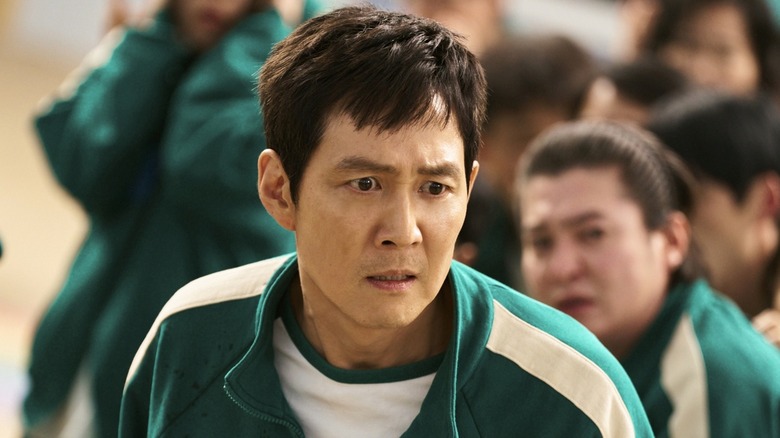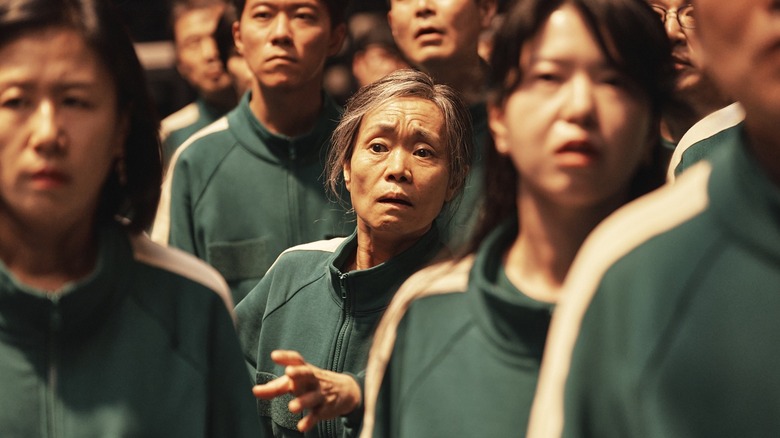Squid Game Season 2 Review: A Mildly Entertaining But Lackluster Follow-Up
- Solid performances
- A few intriguing twists
- Unabashed gore
- Uninspired plot
- A rehash of previous events
- Dull and one-dimensional new characters
When Netflix announced the renewal of the 2021 juggernaut "Squid Game" for two more seasons, I was filled with excitement and doubt like millions of fans across the world. How do you follow up something so potent and compelling, that told the story it wanted in 9 episodes? Is it possible or eve necessary to continue a well-rounded narrative that was basically wrapped up (save for a somewhat forced cliffhanger at the ending of Season 1)? I desperately want to say "yes" to those questions, but it pains me to state that "Squid Game" Season 2 is nothing but a rehash of a debut season that captured lightning in a bottle, unable to reach those same heights again.
We pick up where Season 1 left off, with a red-haired Gi-hun (Lee Jung-jae) not getting on the plane to join his daughter in America but instead swearing to take revenge on the people responsible for hundreds of deaths. After that ominous phone call from the Front Man (Lee Byung-hun), we jump ahead two years, which Gi-hun has spent obsessively trying to find the guy who recruited him and preparing to take down the entire illegal organization if he can actually locate them. He hires a man and his team to scatter like bait around Seoul's train stations, hoping to lure out the Salesman (Gong Yoo) who made him join the games. For two years, there's nothing — not a single trace. Then, out of nowhere, the Salesman turns up, and Gi-hun won't let this one opportunity slip away.
In the meantime, we also learn that Jun-ho (Wi Ha-joon) — who should be dead — has survived the encounter with the Front Man, even if his memory hasn't. He does recall everything about the games except the island where they were located. After a long recovery in the hospital, he tries to continue investigating the case, but none of his police superiors really believe him since he has no proof. As fate has it, he and Gi-hun meet and realize they share the same goal: to find and stop the games and everyone behind them. They inevitably return to the island, but not under the circumstances they want. Unsurprisingly outmaneuvered by the Front Man and his staff, Gi-hun will need to participate in the games one more time to get a shot at shutting them down. He believes, with his previous experience and knowledge, he can convince newcomers to forfeit and realize the deck is stacked against them. But that's not how desperation and greed work, and his plan quickly turns into a hopeless, nightmarish scenario.
A few good ideas can't save uninspired writing
Season 2 bleeds from several wounds, but mostly it feels unnecessary and contrived. Despite taking three years to make, the writers fail to reach the same level as Season 1. The first two episodes are actually intriguing, bringing back familiar faces along with new ones, and feature the moral complexity and personal drama that "Squid Game" is so good at — Gong Yoo's wild and deranged performance as the Salesman is a highlight, even if it's short-lived. There's a sense early on that the additional seven episodes (all provided for review) can dig deeper into moral integrity, greed, and capitalism, as well as revenge and justice, but the bubble starts bursting as soon as we get transported back to the island.
Though Gi-hun was far from the smartest character in the series even before, his vague, thin strategy here becomes more and more underwhelming. For someone as bloodthirsty and dedicated as him — with two years to prepare for vengeance — his cluelessness and naivety become increasingly unrealistic as the games unfold. Beyond the first challenge (which brings back Red Light, Green Light — still among the most brutal scenes in the original — and plays out much the same as before), he rapidly loses his initial confidence and determination. It feels both frustrating and repetitive to watch these events unfold, sometimes almost as identically as they did three years ago, sans the element of surprise.
Yes, there are new games that meant to provide variety and freshness, but they're far less imaginative and thrilling than the originals. That's also due to the new characters, who are at times funnier and crazier than their predecessors yet too forgettable and one-dimensional to root for or against. Noticeably, Season 2 often trades the mounting tension for jokes and laughs, almost ridiculing its own drama and causing the intensity to slowly deflate over time.
Promising twists, lackluster execution
As a fan, and without spoiling any twists, I appreciated most of the different directions (though there aren't many) the show tries to take. There are plot turns early on that brim with potential, yet the vast possibilities they hold are never fully realized or emotionally rewarding in the long term. In its execution, Season 2 fumbles to recreate that inner depth and captivating drama that made the series so emotionally rich and riveting before — there isn't a Sae-byeok (Jung Hoyeon), Oh Il-nam (Oh Yeong-su), or Ali (Anupam Tripathi) to truly feel for or relate to.
Instead, Season 2 comes off as a shell of the show's excellent former self, desperately trying to manufacture and revamp all the elements that made it an unexpected and fascinating cultural phenomenon. That's an inescapable and constant problem here: where there was genuine drama, sincere characters, and deeply felt emotions before, now there are formulas, attempts at shock value, and self-fabricated conflicts for the sake of being sensational and grandiose. This is most palpable in the unnecessarily long scenes like the voting process after each game, the violent yet often bagatelle disputes between new players, and the blatantly flagrant ending solely designed to prepare the way for one more season that's already been ordered by Netflix.
I won't say that "Squid Game" Season 2 is terrible or not decently entertaining at times, but compared to the high quality it delivered previously, it's certainly a step in the wrong direction.
"Squid Game" Season 2 premieres on Netflix on December 26.


